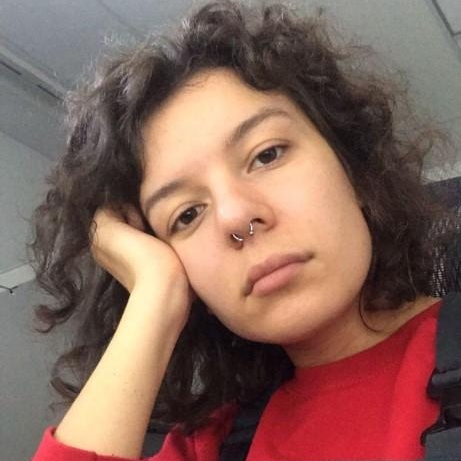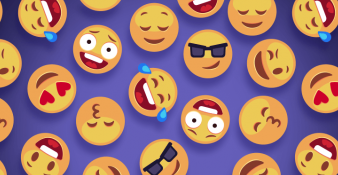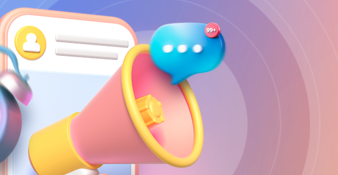Case Study: How Hilton uses social listening to win customers
Summary
In this social listening case study, we explore how Hilton uses social listening to provide a perfect customer experience, make killer marketing campaigns and build relationships.
Hilton is one of the most famous hospitality brands in the world. Hilton Worldwide owns twelve portfolio brands that include over 4,100 hotels and over 680,000 rooms in 91 countries. With that many customers scattered around the world, Hilton is challenged with providing the most convenient channels of communication.
In this social media case study, I wanted to explore how Hilton uses social listening. Unsurprisingly, more and more Hilton guests are heading to social media to voice their concerns, require customer support, ask for recommendations, or give a praise to the staff. Hilton had to find a way to follow their customers and decided to build a social listening strategy to always be on alert and respond whenever, wherever to whomever.
By signing up I agree to the Terms of Use and Privacy Policy
Hilton Case Study

On average, Hilton Hotels receives about 1.5 thousand Twitter mentions every day. Most of them are related to special offers promoted by tourist companies, advertising, news, and guests sharing pictures and tagging the location. As you see, most of these mentions do not require an immediate response.
The Positive Sentiment appears to be more common among social media users than Negative when talking about Hilton, which is good news for them!
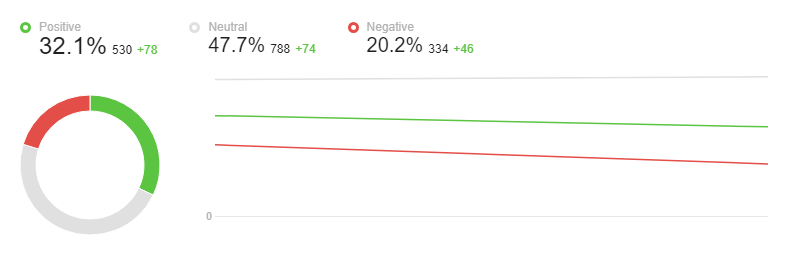
And the most popular platform of discussion for them is, unsurprisingly, Twitter.
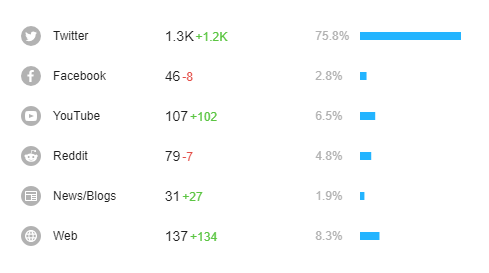
So let’s see if Hilton takes these insights into account when building its social media strategy.
By signing up I agree to the Terms of Use and Privacy Policy
Social customer support
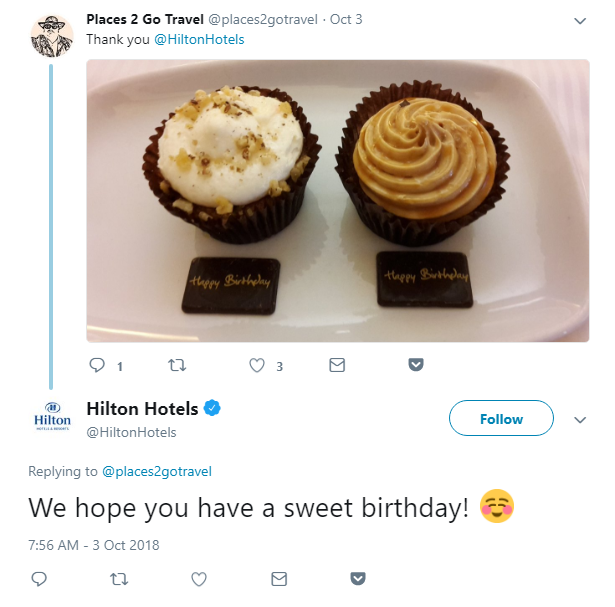
Oftentimes people post about their positive experience in Hilton: they show their cosy room or a beautiful view, they thank the staff for their services publically or simply say how happy they are with their trip. This kind of mentions doesn’t require a response per se, but acknowledging positive experiences of your customers makes a brand seem more humane, genuine, and caring. Moreover, if your customer has some kind of social media following, chances are your response won’t go unnoticed. That’s why it’s a good idea to acknowledge your customers’ positive mentions. And Hilton does it perfectly!
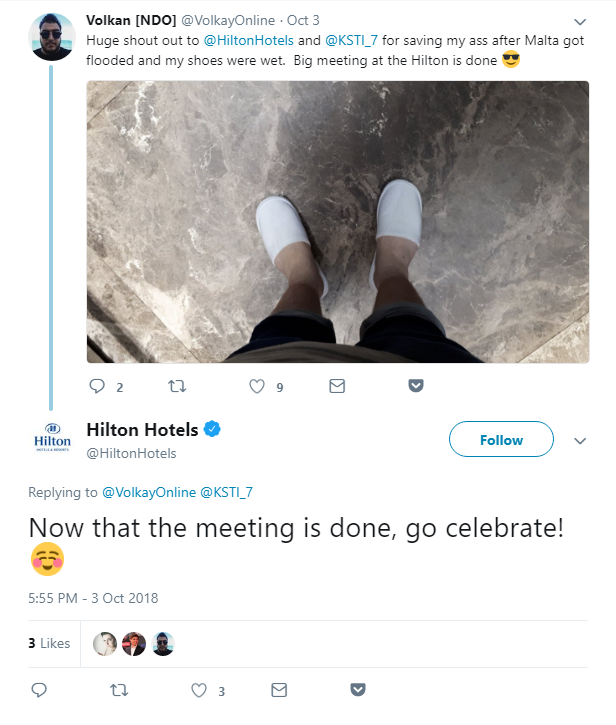
But it’s not all roses and peaches: as with any big brand, there are occasional complaints. And in hospitality, complaints from clients are extremely important. You can deal with a broken toaster later, but if your living space is not in a satisfactory state, it becomes your top priority. That’s why time is extremely important here.
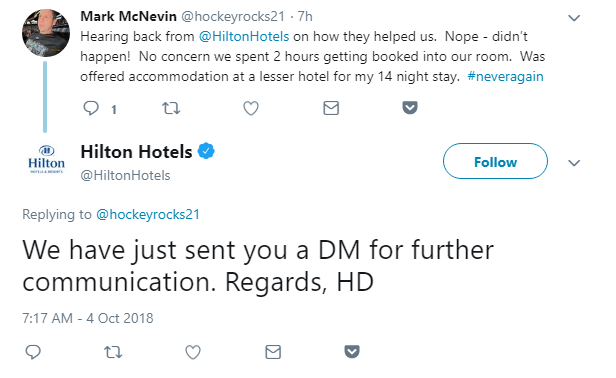
Messages like this one are not just a customer service issue — they can potentially damage the reputation of the brand. That’s why it’s extremely important to respond to them as soon as possible. The disappointed guests need an immediate answer — and if they don’t get one, they will be even harsher with their critique. The average response time for a brand to reply on social media is 10 hours, while the average user will only wait 4 hours.
On average, Hilton Hotels answers 3.3 tweets in one hour, and the average time between a tweet and a response equals 37.3 minutes (after analyzing 872 tweets during one month).
That’s the power of social listening. It enables Hilton’s social media team to react and engage in real time, depending only on manpower. Hilton made a decision to combine their social customer support with call centre and in-app support through Expion tool to make their customer service experience perfect.
“We took a different approach than a lot of companies. We want to help our guests no matter how they come to us. No matter how they want help — in the app, at the front desk, or on Twitter. We are there where they want us,” Vanessa Sain-Dieguez, Social Business Lead & Strategist for Hilton Worldwide notes.
Hilton’s guest service center is housed within their call center. Their social team monitors all Twitter mentions around the clock and aims to engage with guests within 30 minutes of a tweet being sent.
Hilton monitors all its brands and hotel level Twitter accounts and looks for what is being said and when to engage. Even if a guest tweets about Hilton, but doesn’t identify them by their handle, Hilton will pick up on the tweet and respond. Monitoring untagged mentions is extremely important. For example, here’s a comparison of the number of tagged and untagged mentions.
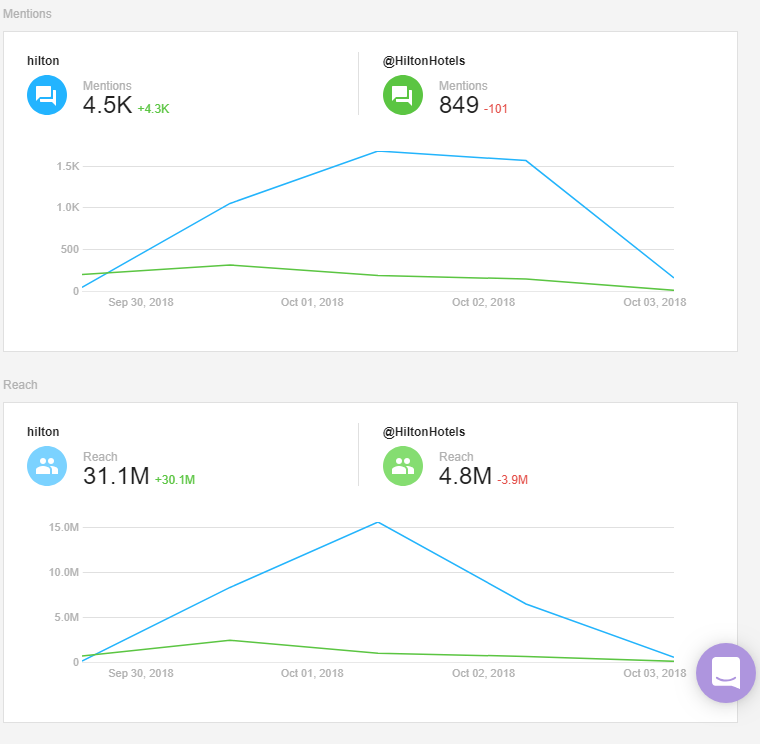
“We want to be available to the customer wherever they are. It just comes down to customer preference, whether they want to tweet our main account or one of our hotels, or don’t @ us at all — and monitoring it all,” remarks Sain-Dieguez.
From the very first response, Hilton aims to resolve all issues within 12 hours, which is an incredibly robust resolution timeframe given that Hilton’s customer service has to communicate with hotels around the globe.
“We recently had a guest who arrived in her hotel room and tweeted a picture of her closet that was not a standard size. Her dress was pooling on the ground, and she wanted it to remain wrinkle free for her meeting the following day. We saw that tweet come through, and within an hour had her in a new room with a full size closet,” Sain-Dieguez explains.
But it’s not just about one time reaction. Hilton uses social listening across different platforms to gather valuable insights for their overall brand strategy. They ensure that guest experience gets turned into actionable insight. All guest comments become part of their reporting. That feedback is then bubbled up to the brands who use it in their strategic planning.
Social Marketing Insights
The feedback Hilton gets from social media not only informs their managing strategy, but also enhances their marketing campaigns. For example, while I was working on this article, Hilton launched a new marketing campaign titled Expect Better which gathered a lot of buzz for the brand. But the mentions of the campaign don’t always include the official hashtag #ExpectBetter or Hilton’s twitter handle. By monitoring words associated with the campaign, for example, such combination as Hilton + Kendrick, their social media marketing team is able to observe and analyze conversations around the campaign and evaluate its success.
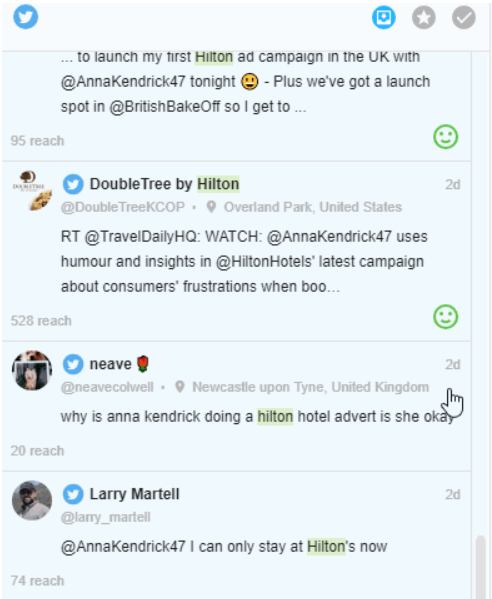
Hilton Suggests
Hilton Suggest is one of the favourite subjects for a social listening case study among marketers. Why? Because it's a unique ideas that successfully uses social listening in a creative way.
For Hilton, social listening is not just a helping hand to inform their marketing strategy, it is the core and essence of the social media marketing strategy. Thanks to social listening, they were able to create @HiltonSuggests.
Hilton Suggest campaign goes beyond reacting to someone else’s social posts and takes initiative. The main idea behind the campaign is to aid people without any ulterior motives to make a sale. Many marketing specialists say that brands today find themselves in the age of sincerity and authenticity. Millennials and generation Z who grew up with the Internet are no longer convinced by straightforward in-your-face advertising, they want to engage and build relationships. That’s exactly what Hilton Suggests does. But what is it exactly?
Hilton Suggests is a helpful concierge, available for everyone travelling to or around more than 115 cities worldwide. Launched in 2009, the Hilton Worldwide initiative is a collection of Hilton employees who volunteer their best local advice with the aim of surprising and delighting travelers on Twitter.
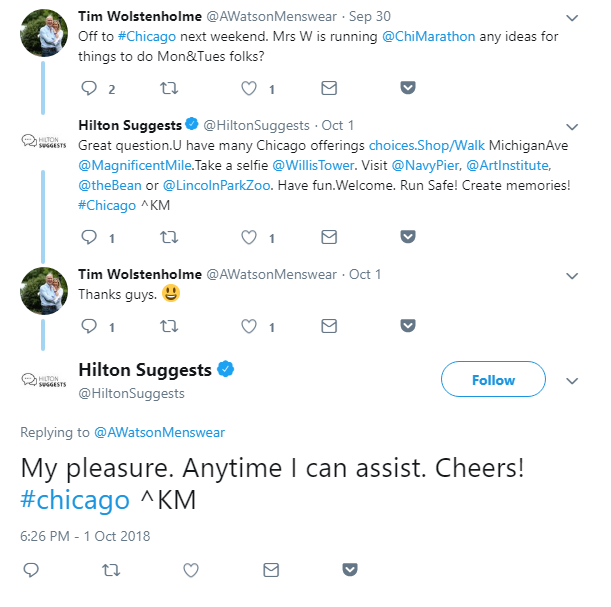
The unique service isn’t based on customers tweeting to @HiltonSuggests and asking for recommendations. Instead, the inquiries are found strictly through social listening for anyone who’s planning a trip to one of the participating cities, and not just Hilton guests. Based on thorough research powered by social listening, the team created specific listening rules to find and reach travelers who might never expect to hear from Hilton.
Sabrina Callahan, director of social media planning and integration at Hilton says that after years of social listening, Hilton developed a “travel excitement” layer of keywords in early 2017 based on past tweets and team member feedback. With that research, Hilton compiled “a rather lengthy list of words and phrases that people use while sharing excitement and anticipation for an upcoming trip.”
The unique quality behind Hilton Suggest is that the people writing recommendations are not a specially formed social media team — they are regular Hilton employees (who passed extensive training, of course) who are excited to share their love for the local attractions with others. And that adds to the authenticity of the program - you don’t simply google “top places to see” in Vienna, you get a personal touch and recommendations tailored to your interests.
By making the first step and reaching out, Hilton is able to promote their brand to people who weren’t aware of it before. Callahan says, “Sometimes travelers will take photos and tag us to say thanks for the great recommendation, and that is a huge win.” Maybe next time a person will remember the hotel that helped them to experience their destination in the best way possible and will choose to stay there.
Hilton proves that social listening can help us to improve our routine activities but also create something new, which would never happen without the power of social media monitoring. What can be learned from this social listening case study?
-
Don’t ignore your customers. If you see that they are choosing social media as a channel for communication (and they are), you should give them the way to reach you.
-
Let social data help you. Social listening isn’t a one-time deal - the insights you get from social media can affect your company's strategy and marketing decisions.
-
Use social listening creatively. Remember, that the whole point of social media is engagement, and social listening can give you opportunities to engage. Don’t neglect them.
What about you? What did you learn from this social listening case study? Let’s discuss it in the comments!
